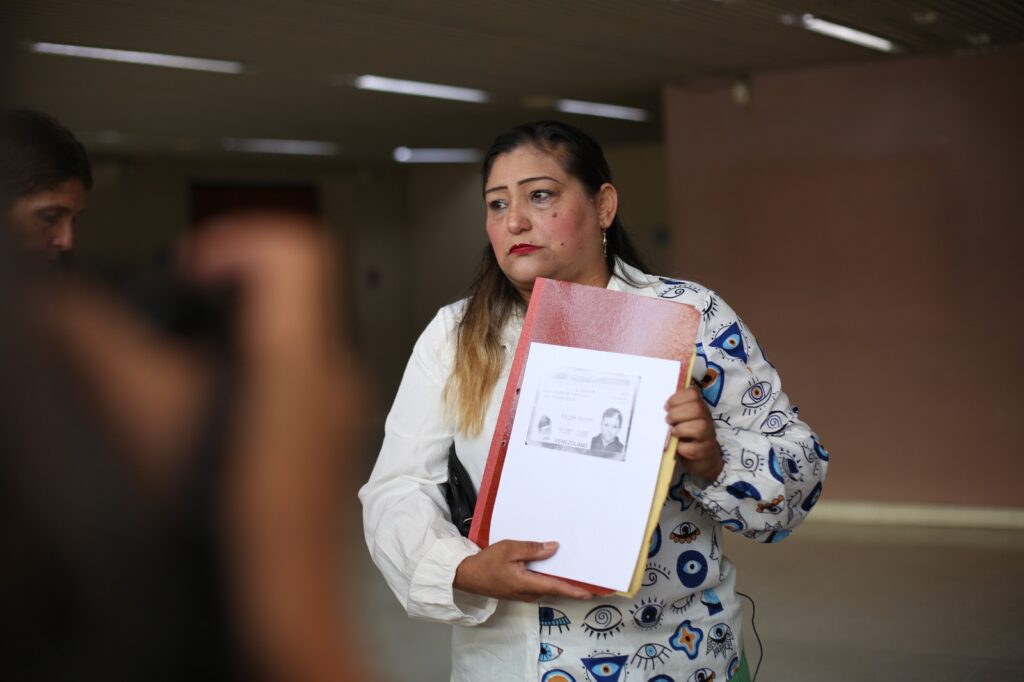Adrian González: A Teen In a Dark Dungeon
16-year-old Adrián González was hanging out with his pals at Parque Central, Caracas, when he was detained by the National Guard. His mom says he wasn’t at a demonstration. She was unable to see him for eight days


Name: Adrián Keiler González Torrealba
Year of birth: 2008
Detention date: July 29, 2024
Area: Caracas, Venezuela
Occupation: middle school student
On the night of July 29th, a day after the presidential election, Leticia Torrealba received a call and learned from a friend that her son, Adrián González, had been detained by the National Guard (GNB), while walking with some friends close to a demonstration near Parque Central in downtown Caracas. She went immediately to the police station in Maripérez to ask for her son’s whereabouts.
The police sent her to the national police detention center called Zona 7, in Boleíta at the other side of the city, where she joined many other mothers of detained youngsters who were asking for their relatives. “We were worried because they said the minors where mixed with adult inmates. It was crazy, we were overwhelmed by the situation,” said Leticia in tears during a meeting with other relatives of imprisoned citizens, organized by human rights NGOs Provea and Foro Penal on August 15th.
The day after his detention, on July 30th, Adrian was transferred from Zona 7 to another police facility, Cochecito in southern Caracas, where his mother was allowed to bring clothes and personal care articles for him, but not to see him.
Adrián was charged with terrorism, incitation of hate and political destabilization. Regarding the gravity of such charges, Leticia says that “it’s just absurd, how can these kids know anything about terrorism? I feel powerless, I can’t do anything, while these kids are being accused of crimes they didn’t commit. Our hands are tied, and our relatives don’t even have access to a private defense.”

Foro Penal has counted at least 129 teenagers among the more than 1,500 people detained after the presidential election, from which only 90 had been released from prison at the time of writing.
It was after eight days of being detained that Adrián was allowed to see his mom. “I asked him if they catched him with a stone in his hand, and he said no.” Adrián told her about the conditions of his imprisonment: “Mom, we have no ventilation, they don’t allow us to talk to anybody, or have a cell phone. I want to go out, I’m desperate.”
During that first visit, Adrian told his mom she must remain calm, that he was going to be okay. But Leticia couldn’t help but being worried. “The only thing that matters is that I can be with him, to hold him, to feel him. As a mom, this is horrible, I feel a knot inside my chest, I’m desperate. He’s an innocent boy who knows nothing about politics.”
“it’s just absurd, how can these kids know anything about terrorism? I feel powerless, I can’t do anything, while these kids are being accused of crimes they didn’t commit”
The teen’s mother told journalists that his son was being treated well, that he wasn’t subject to other forms of violence, but she didn’t know if she would have permission to see him regularly. The police told her that they would call or text her when the time for visit came. She learned from other relatives of prisoners that she missed a visit day and that Adrián was very sad for not seeing her there.
Leticia hopes to have Adrián home with her other three children. “All I want is this situation to end. I want freedom, to have my kid fine and out of jail. That’s all I ask.”
Caracas Chronicles is 100% reader-supported.
We’ve been able to hang on for 22 years in one of the craziest media landscapes in the world. We’ve seen different media outlets in Venezuela (and abroad) closing shop, something we’re looking to avoid at all costs. Your collaboration goes a long way in helping us weather the storm.
Donate




